中考英语专题复习
中考英语考点专项复习专题一名词含解析
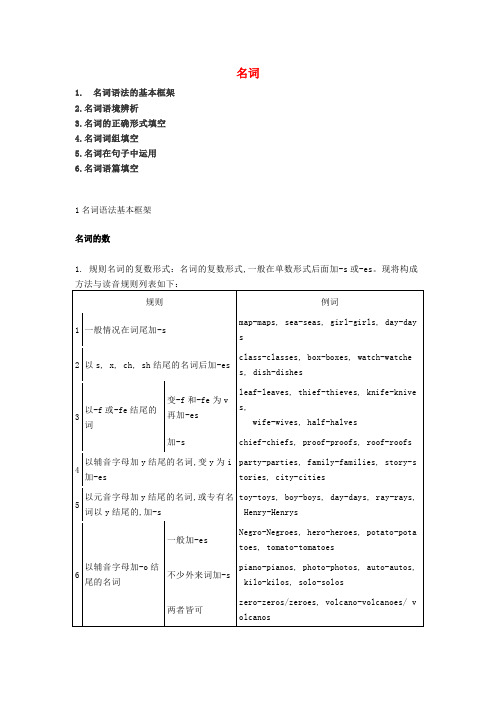
名词1. 名词语法的基本框架2.名词语境辨析3.名词的正确形式填空4.名词词组填空5.名词在句子中运用6.名词语篇填空1名词语法基本框架名词的数名词的所有格名词单复数的判断1.如何判定是可数名词还是不可数名词①可数名词有单数和复数两种形式,如:desk,desks;②可数名词前面可以被基数词,不定冠词(a/an),many修饰,如:three boys,an apple, many students。
2.如何判定是不可数名词①不可数名词没有复数形式,如:tea,meat;②不可数名词,若表示数量,可用量词加不可数名词,如:a piece of paper, two cups of tea。
3. 常见的名词修饰词①只修饰可数名词的修饰语few 几乎没有a few 有几个several 有几个many 很多a couple of 两个a number of 若干a great/large number of 许多②只修饰不可数名词的修饰语little很少,几乎没有a little有一点儿much很多a good/great deal of很多a bit of有一点儿a large amount of大量的③既可修饰可数名词又可修饰不可数名词的修饰语some 一些a lot of 很多lots of 很多plenty of 充足的enough 足够的most 大多数的hardly any 几乎没有the rest of 剩下的名词拓展1.voice, noise, soundvoice指人的说话声或唱歌声,指人的“嗓音”;noise是“吵闹声、噪音”,指不悦耳的声音;sound指自然界中的任何声音。
2.work与jobwork是不可数名词,指需花费体力和脑力的工作;job是可数名词,多指“零工”或“短工”。
例:a part-time job一份兼职工作;out of work 失业3.family, home, housefamily强调整体,指“家、家庭”时,谓语动词用单数;强调个人,指“家庭成员”时,谓语动词用复数;不用于指住房。
中考英语专题复习主谓一致

中考英语专题复习主谓一致Standardization of sany group #QS8QHH-HHGX8Q8-GNHHJ8-HHMHGN#中考英语专项复习------主谓一致【主谓一致命题】1、主谓一致的语法一致原则2、主谓一致的整体一致原则3、主谓一致的就近一致原则4、主谓一致的意义一致原则5、主谓一致的附加原则【考点】一、由or, either... or... , neither... nor... , not only...but also... , whether...or...等连接并列主语时,常采用就近原则,动词与最靠近的主语保持一致。
【考例】Not only Jim but also his sister ______a few cities in the southsince they came to China.[临沂市]A.will visit B. has visited C.have visitedD .visitedNeither Jim nor his cousins _______to America, but _____of them know the country very well. [0潍坊市]A.have been;a11 B. have been; both C has been; all D.has been; both二、 the number of + 复数名词,主语是the number(数量),谓语动词用单数;a number of +复数名词,主语是复数名词,a number of作定语, 相当于many,谓语动词用复数。
【考例】Look! There _______ playing with the tourists on Yinhe Square. (包头) A. are a number of deer B. are a number of deers C. is a number of deerD. is a number of deersThe number of ________ in our class ________ fifty. (烟台)A. student, isB. the students, areC. the students, isD. students, are三、动词不定式、动名词以及名词性从句作主语时,谓语动词常用单数形式。
中考英语专题系动词、助动词情态动词复习

语法互动(十)┃系动词、助动词和情态动词
(2)could也可表示现在,用于婉转地提出请求、建议等,回 答时用can。 —Could you show me the way to the hospital? 你能告诉我去医院的路吗? —Of course I can.当然可以。 (3)can与be able to的区别 can只能用于一般现在时和一般过去时,而be able to可用于 任何时态。 He was able to flee to Europe before the war broke out. 战争 爆发前他成功地逃到了欧洲。
精品PPT
语法互动(十)┃系动词、助动词和情态动词
6.will和would的用法 will用于第二人称的疑问句时,表示征求意见或提建议。 would 为 will 的过去式,可用于多种人称,表示意愿。 Will you have a little soup? 你要不要喝点汤?
精品PPT
语法互动(十)┃系动词、助动词和情态动词
7.归纳:情态动词表推测的用法 (1)肯定句中一般用must(一定),may(可能),might/could(也 许,或许),其中must表推测的语气最强,其余依次减弱。 The book must be hers. Her name is on it. 这本书一定是她的,她的名字在上面。 He must be running.他一定在跑步。 They may know the way to the library. 他们可能知道去图书馆的路。
精品PPT
语法互动(十)┃系动词、助动词和情态动词
2.—He ________ be in the classroom, I think.
—No, he ________ be in the classroom. I saw him go
中考英语词汇专题复习教案
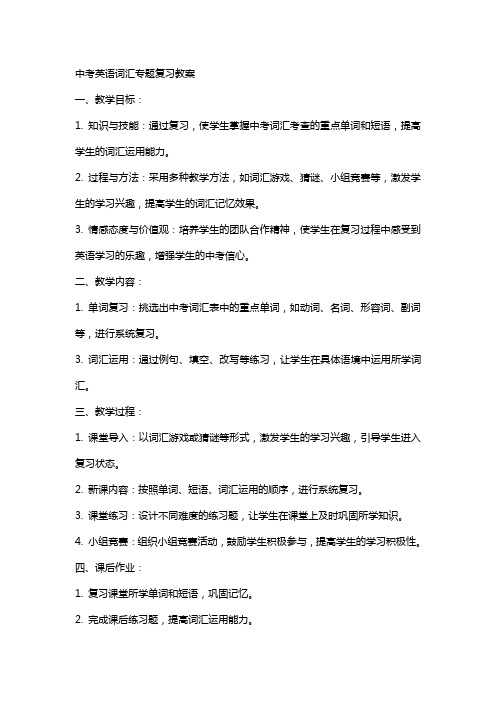
中考英语词汇专题复习教案一、教学目标:1. 知识与技能:通过复习,使学生掌握中考词汇考查的重点单词和短语,提高学生的词汇运用能力。
2. 过程与方法:采用多种教学方法,如词汇游戏、猜谜、小组竞赛等,激发学生的学习兴趣,提高学生的词汇记忆效果。
3. 情感态度与价值观:培养学生的团队合作精神,使学生在复习过程中感受到英语学习的乐趣,增强学生的中考信心。
二、教学内容:1. 单词复习:挑选出中考词汇表中的重点单词,如动词、名词、形容词、副词等,进行系统复习。
3. 词汇运用:通过例句、填空、改写等练习,让学生在具体语境中运用所学词汇。
三、教学过程:1. 课堂导入:以词汇游戏或猜谜等形式,激发学生的学习兴趣,引导学生进入复习状态。
2. 新课内容:按照单词、短语、词汇运用的顺序,进行系统复习。
3. 课堂练习:设计不同难度的练习题,让学生在课堂上及时巩固所学知识。
4. 小组竞赛:组织小组竞赛活动,鼓励学生积极参与,提高学生的学习积极性。
四、课后作业:1. 复习课堂所学单词和短语,巩固记忆。
2. 完成课后练习题,提高词汇运用能力。
3. 自主学习拓展词汇,增加词汇量。
五、教学评价:1. 课堂表现:观察学生在课堂上的参与程度、发言情况等,了解学生的学习状态。
2. 课后作业:检查学生的作业完成情况,评估学生的学习效果。
3. 单元测试:定期进行单元测试,检验学生对中考词汇的掌握程度。
4. 学生反馈:听取学生的意见和建议,不断调整教学方法,提高教学质量。
六、教学策略:1. 多样化教学:运用图片、视频、音频等多种教学资源,丰富教学手段,提高学生的学习兴趣。
2. 情境教学:创设真实的生活情境,让学生在语境中学习词汇,提高词汇的运用能力。
3. 联想记忆:引导学生运用联想记忆法,帮助学生记忆单词和短语。
4. 巩固练习:通过课后作业、课堂练习等形式,及时巩固所学知识。
5. 反馈与评价:定期进行教学反馈,了解学生的学习情况,调整教学策略。
中考英语复习资料

中考英语复习资料中考英语复习资料11.动词的八种时态的构成及用法;2.动词被动语态的构成及用法;3.非谓语动词的构成及用法;4.近义动词的用法区别。
【名师点睛】1.动词的时态英语时态用共有十六种时态,其中常用的有8种,它们是:一般现在时、一般过去时、一般将来时、现在进行时、现在完成时、过去进行时、过去完成时和过去将来时。
(1)一般现在时的基本用法1) 经常性或习惯性的动作,常与表示频度的时间状语连用。
时间状语:every…, sometimes,at…, on SundayI leave home for school at 7 every morning.2) 客观真理,客观存在,科学事实。
The earth moves around the sun.Shanghai lies in the east of China.3) 表示格言或警句中。
Pride goes before a fall.【注意】此用法如果出现在宾语从句中,即使主句是过去时,从句谓语也要用一般现在时。
例:Columbus proved that the earth is round..4) 现在时刻的状态、能力、性格、个性。
I dont want so much.5) 某些动词如come, go, move, stop, leave, arrive, be, finish, continue, start 等,在一般现在时句中可用来表示将来肯定会发生的动作。
The train comes at 3 oclock.6) 在时间状语从句或条件状语从句中,一般现在时代替一般将来时。
Ill help you as soon as you have problem.Tell Xiao Li about it if you meet him.(2)一般过去时的用法:表示过去某一时刻或某一段时间内所发生的动作或情况,通常一般过去式带有表示动作时间状语的词,词组或从句,如yesterday, the day before last, last week, two days ago 等,上下文清楚时可以不带时间状语。
中考英语专项复习专题【形容词、副词】(附例题以及答案)
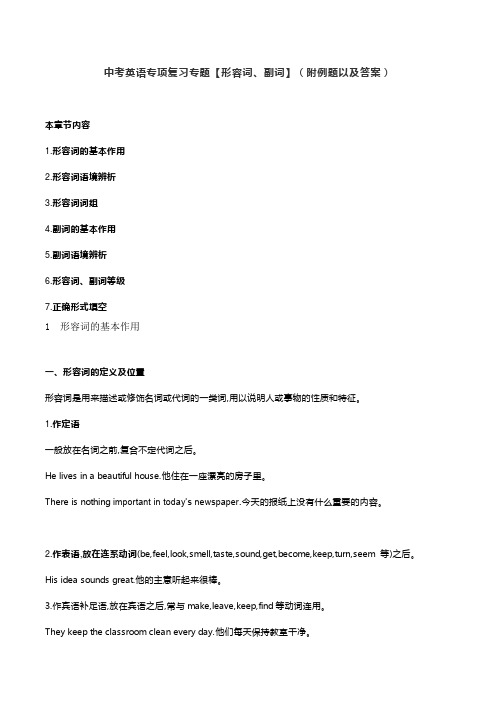
中考英语专项复习专题【形容词、副词】(附例题以及答案)本章节内容1.形容词的基本作用2.形容词语境辨析3.形容词词组4.副词的基本作用5.副词语境辨析6.形容词、副词等级7.正确形式填空1 形容词的基本作用一、形容词的定义及位置形容词是用来描述或修饰名词或代词的一类词,用以说明人或事物的性质和特征。
1.作定语一般放在名词之前,复合不定代词之后。
He lives in a beautiful house.他住在一座漂亮的房子里。
There is nothing important in today’s newspaper.今天的报纸上没有什么重要的内容。
2.作表语,放在连系动词(be,feel,look,smell,taste,sound,get,become,keep,turn,seem 等)之后。
His idea sounds great.他的主意听起来很棒。
3.作宾语补足语,放在宾语之后,常与make,leave,keep,find等动词连用。
They keep the classroom clean every day.他们每天保持教室干净。
We find it important to learn English well.我们发现学好英语很重要。
4.形容词的名词化有些形容词放在定冠词之后变成名词,表示一类人,常见的有:good/bad,rich/poor,young/old,deaf/blind, black/white,living/dead等The old should be taken good care of.老年人应该受到很好的照顾。
2形容词词义辨析rich富有的↔ poor贫穷的happy高兴的↔ angry生气的short短的↔ long长的same相同的↔ different不同的3形容词短语辨析形容词短语在单项填空中考查词义辨析,在词组翻译中考查词义及拼写。
这就要求不仅要知道意思,还要能准确地写出来。
中考英语专项复习专题【宾语从句】(附例题以及答案)

中考英语专项复习专题【宾语从句】(附例题以及答案)本章节内容:1. 宾语从句概述(时态,语序,引导词)2.宾语从句的注意点3.宾语从句解题技巧宾语从句为中考的必考点,主要在单项选择题中考查,侧重考查其引导词、语序、时态的应用。
一般至少会涉及两个考查点。
①引导词相同,语序和时态不同;②时态一致,语序和引导词不同。
而且通常都会在一些固定的句型中涉及,如I wonder,Would/Could you please tell me.,Can you tell me,Do you know,I don’t know等等。
考生在做此类试题时,首先从语序着手,宾语从句的语序应该为陈述句语序,即:主语+谓语+宾语+其他;再从时态考虑,一般情况下,宾语从句的时态要和主句的时态保持一致,但是,如果有明显的时间状语,要以时间状语来判断时态;最后,再根据答语来判断疑问词。
1宾语从句概述2注意点(1)否定转移当主句的主语为第一人称,谓语动词是think,believe,suppose等时,要将宾语从句的否定词转移到主句中,即主句的谓语动词用否定形式,而宾语从句的谓语动词用肯定形式。
I don’t think he will come with you.我认为他不会和你一起来。
(2)宾语从句的简化①当宾语从句的主语和主句的主语相同,且主句的谓语动词是hope,wish,decide,agree,choose等时,从句可简化为不定式结构。
I hope that I can receive your e-mail.=I hope to receive your e-mail.我希望能收到你的电子邮件。
②当宾语从句的主语和主句的主语相同,且主句的谓语动词是know,remember,forget,learn等时,从句可简化为“疑问词+不定式”结构。
She doesn’t know what she should do next.=She doesn’t know what to do next.她不知道下一步该做什么。
初中英语中考复习资料全
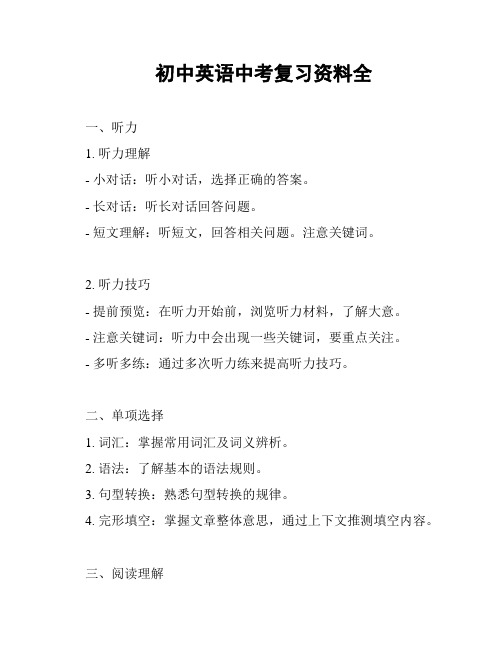
初中英语中考复习资料全
一、听力
1. 听力理解
- 小对话:听小对话,选择正确的答案。
- 长对话:听长对话回答问题。
- 短文理解:听短文,回答相关问题。
注意关键词。
2. 听力技巧
- 提前预览:在听力开始前,浏览听力材料,了解大意。
- 注意关键词:听力中会出现一些关键词,要重点关注。
- 多听多练:通过多次听力练来提高听力技巧。
二、单项选择
1. 词汇:掌握常用词汇及词义辨析。
2. 语法:了解基本的语法规则。
3. 句型转换:熟悉句型转换的规律。
4. 完形填空:掌握文章整体意思,通过上下文推测填空内容。
三、阅读理解
1. 标题理解:快速浏览文章,找出文章的主旨。
2. 细节理解:仔细阅读文章,找出特定细节。
3. 推理判断:根据文章内容进行推理判断。
4. 表达态度:理解文章作者的观点和态度。
四、写作
1. 书面表达:掌握合适的表达方式和句子结构。
2. 话题写作:对于给定的话题,能够展开合理的写作内容。
五、口语交际
1. 日常交际:熟练掌握日常用语表达。
2. 问答对话:能流利且准确地进行问答对话。
六、应试技巧
1. 时间安排:合理规划考试时间,合理分配各个部分所需时间。
2. 注意细节:注意题目的要求和限制条件。
3. 充分准备:提前复并进行模拟练。
以上是初中英语中考复的一些重点内容和技巧,希望对你的复
有所帮助。
中考英语专项复习-课件

Step 3
A. less outgoing than me B. not so calm as I C. more active than I D. as outgoing as I
12. ---Do you like the two skirts? ---The yellow one is good but the green one looks ______.
3. I hope our life will be _____ in the future.
A. better and better B. good and good C. good and better D. better and good
4. 根据汉语完成句子
你越来越漂亮了。
You are getting more and more beautiful.
构成
规则变化
1。单音节词在词尾加-er构成比较级,
加-est构成最高级。
原级
比较级
最高级
bright
brighter
brightest
young
yonger
yongest
long
longer
longest
2.以字母e 结尾的词只加-r或- st构成比
较级和最高级。nicenicernicest
fine
8. ---She eats ——meat than she did last year. ---That’s why she’s getting fatter.
中考英语专项复习专题【被动语态】(附例题以及答案)

中考专项复习专题【被动语态】(附例题以及答案)本章节内容1.被动语态的基本形式2.不同时态的被动语态3.被动语态的技巧指导4.常见主动语态变被动语态的特殊情况5.被动语态在句子中运用1被动语态的基本形式一、被动语态的结构被动语态的结构为be动词加动词的过去分词,即“be+done”。
在不同的时态中,be动词有不同的形式。
二、常用被动语态的情况1.不知道动作的执行者是谁。
This watch is made in China.这块手表是中国制造的。
2.没有必要指出动作的执行者是谁。
Many trees must be planted every year.每年必须种许多树。
3.需要强调或突出动作的承受者。
Chinese is spoken by more and more people in the world.世界上越来越多的人说汉语。
(强调汉语的广泛使用)4.动作的发出者是物。
Many houses were washed away by the flood.许多房子被洪水冲走了。
2不同时态的被动语态1.时态和语态的结合是中考的必考点,尤其是一般现在时、一般过去时和一般将来时的被动语态。
2.其他时态的被动语态3.含有情态动词的被动语态结构为“情态动词+be+done”。
Your homework must be finished today.你的作业今天必须完成。
3被动语态的技巧指导(1)根据选项定考点单项填空对语态的考查均会结合时态,4个选项中一般包含两个主动语态,两个被动语态;而其对时态的考查一般不会涉及语态。
因此,如果选项中出现被动语态,即可判断此题考查被动语态,由此便可排除非被动语态的选项。
(2)根据时态选答案首先,考生需要根据关键词(时间状语)来判断时态。
对于没有关键词的试题,则要根据上下文已经给出的时态、语境理解并结合常识进行判断。
如:—Tell me one thing you’re proud of in your junior high school, Tony.—I ___ as the captain of the school football team.A. chooseB. choseC. am chosenD. was chosen方法点拨第1步:根据选项A、B为时态,C、D为被动语态可知本题考查被动语态,因此可排除A、B两项。
初中英语中考专题复习——动词语境辨析(实义动词+近义动词+感官动词)
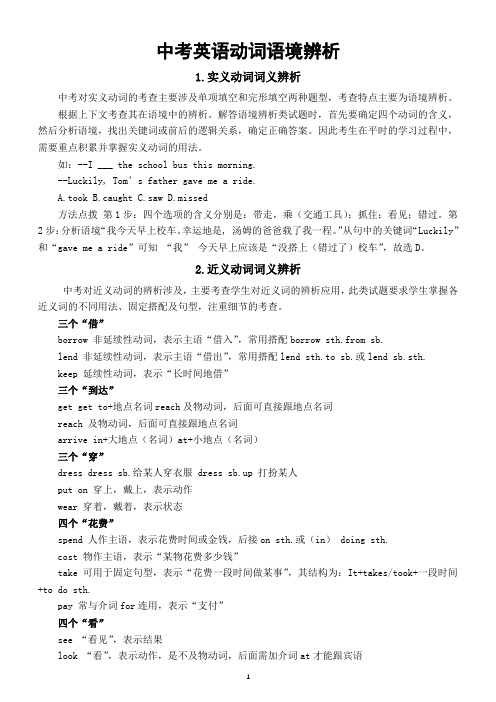
中考英语动词语境辨析1.实义动词词义辨析中考对实义动词的考查主要涉及单项填空和完形填空两种题型,考查特点主要为语境辨析。
根据上下文考查其在语境中的辨析。
解答语境辨析类试题时,首先要确定四个动词的含义,然后分析语境,找出关键词或前后的逻辑关系,确定正确答案。
因此考生在平时的学习过程中,需要重点积累并掌握实义动词的用法。
如:--I ___ the school bus this morning.--Luckily, Tom’s father gave me a ride.A.tookB.caughtC.sawD.missed方法点拨第1步:四个选项的含义分别是:带走,乘(交通工具);抓住;看见;错过。
第2步:分析语境“我今天早上校车。
幸运地是, 汤姆的爸爸载了我一程。
”从句中的关键词“Luckily”和“gave me a ride”可知“我”今天早上应该是“没搭上(错过了)校车”,故选D。
2.近义动词词义辨析中考对近义动词的辨析涉及,主要考查学生对近义词的辨析应用,此类试题要求学生掌握各近义词的不同用法、固定搭配及句型,注重细节的考查。
三个“借”borrow 非延续性动词,表示主语“借入”,常用搭配borrow sth.from sb.lend 非延续性动词,表示主语“借出”,常用搭配lend sth.to sb.或lend sb.sth.keep 延续性动词,表示“长时间地借”三个“到达”get get to+地点名词reach及物动词,后面可直接跟地点名词reach 及物动词,后面可直接跟地点名词arrive in+大地点(名词)at+小地点(名词)三个“穿”dress dress sb.给某人穿衣服 dress sb.up 打扮某人put on 穿上,戴上,表示动作wear 穿着,戴着,表示状态四个“花费”spend 人作主语,表示花费时间或金钱,后接on sth.或(in) doing sth.cost 物作主语,表示“某物花费多少钱”take 可用于固定句型,表示“花费一段时间做某事”,其结构为:It+takes/took+一段时间+to do sth.pay 常与介词for连用,表示“支付”四个“看”see “看见”,表示结果look “看”,表示动作,是不及物动词,后面需加介词at才能跟宾语watch “观看(比赛、电视等)”read “看(书、报等)”,表示阅读四个“说”speak 作及物动词时后接表示语言的名词,表示“说,讲述”say 常跟直接引语或间接引语,表示说的内容talk 是不及物动词,常跟介词to和with,意为“同……谈话”,也表示具有说话能力tell 意为“告诉”,与story连用,意为“讲故事”四个“拿”bring “带来,拿来”,表示拿到靠近说话人的地方take “拿去,带走”,表示拿到远离说话人的地方carry “扛,搬,用力移动”,没有方向fetch “去取,去拿”,表示往返拿东西四个“赢,输”lose 意为“输给”某人,固定搭配为lose to sb.fail 意为“失败”或“未做成某事”beat 意为“打败”,后接人或某支队伍win 意为“赢得,荣誉,地位,比赛等”四个“参加”join 一般指加入“党派”或“组织”并成为其中一员,如参军,入党,入团等join in 指参加竞赛、娱乐、游戏等活动take part in 指参加聚会或群众性活动attend 一般指出席会议、典礼、婚礼等四个“变化”turn 一般用于颜色的变化get 天变黑、变长或变短become 天气变暖或变冷等,表示渐变grow 形状变大或变小3.感官动词词义辨析sound 意为“听起来……”指听觉。
(完整版)九年级英语专项复习
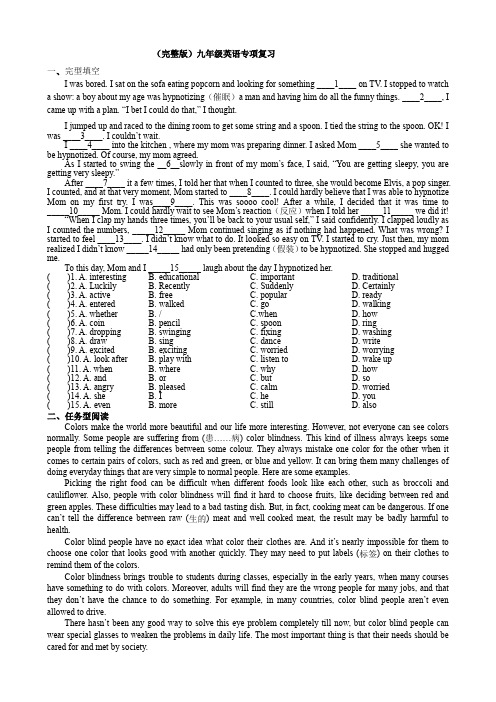
(完整版)九年级英语专项复习一、完型填空I was bored. I sat on the sofa eating popcorn and looking for something ____1____ on TV. I stopped to watcha show: a boy about my age was hypnotizing(催眠)a man and having him do all the funny things. ____2____, I came up with a plan. “I bet I could do that,” I thought.I jumped up and raced to the dining room to get some string and a spoon. I tied the string to the spoon. OK! I was ____3____. I couldn’t wait.I ____4____ into the kitchen , where my mom was preparing dinner. I asked Mom ____5____ she wanted to be hypnotized. Of course, my mom agreed.As I started to swing the __6__slowly in front of my mom’s face, I said, “You are getting sleepy, you are getting very sleepy.”After ____7____ it a few times, I told her that when I counted to three, she would become Elvis, a pop singer.I counted, and at that very moment, Mom started to ____8____. I could hardly believe that I was able to hypnotize Mom on my first try. I was____9____. This was soooo cool! After a while, I decided that it was time to _____10_____ Mom. I could hardly wait to see Mom’s reaction(反应)when I told her _____11_____ we did it!“When I clap my hands three times, you’ll be back to your usual self,” I said confidently. I clapped loudly as I counted the numbers, _____12_____ Mom continued singing as if nothing had happened. What was wrong? I started to feel ____13____. I didn’t know what to do. It looked so easy on TV. I started to cry. Just then, my mom realized I didn’t know _____14_____ had only been pretending(假装)to be hypnotized. She stopped and hugged me.To this day, Mom and I _____15_____ laugh about the day I hypnotized her.( )1. A. interesting B. educational C. important D. traditional( )2. A. Luckily B. Recently C. Suddenly D. Certainly( )3. A. active B. free C. popular D. ready( )4. A. entered B. walked C. go D. walking( )5. A. whether B. / C.when D. how( )6. A. coin B. pencil C. spoon D. ring( )7. A. dropping B. swinging C. fixing D. washing( )8. A. draw B. sing C. dance D. write( )9. A. excited B. exciting C. worried D. worrying( )10. A. look after B. play with C. listen to D. wake up( )11. A. when B. where C. why D. how( )12. A. and B. or C. but D. so( )13. A. angry B. pleased C. calm D. worried( )14. A. she B. I C. he D. you( )15. A. even B. more C. still D. also二、任务型阅读Colors make the world more beautiful and our life more interesting. However, not everyone can see colors normally. Some people are suffering from (患……病) color blindness. This kind of illness always keeps some people from telling the differences between some colour. They always mistake one color for the other when it comes to certain pairs of colors, such as red and green, or blue and yellow. It can bring them many challenges of doing everyday things that are very simple to normal people. Here are some examples.Picking the right food can be difficult when different foods look like each other, such as broccoli and cauliflower. Also, people with color blindness will find it hard to choose fruits, like deciding between red and green apples. These difficulties may lead to a bad-tasting dish. But, in fact, cooking meat can be dangerous. If one can’t tell the difference between raw (生的) meat and well-cooked meat, the result may be badly harmful to health.Color blind people have no exact idea what color their clothes are. And it’s nearly impossible for them to choose one color that looks good with another quickly. They may need to put labels (标签) on their clothes to remind them of the colors.Color blindness brings trouble to students during classes, especially in the early years, when many courses have something to do with colors. Moreover, adults will find they are the wrong people for many jobs, and that they don’t have the chance to do something. For example, in many countries, color blind people aren’t even allowed to drive.There hasn’t been any good way to solve this eye problem completely till now, but color blind people can wear special glasses to weaken the problems in daily life. The most important thing is that their needs should be cared for and met by society.Definition(定义):Some people have 1)______________ telling thedifferences between certain colors.三、语篇填空Sarah Chang loves playing the violin very much. She says that the violin is one of the1)_____________(close) music to the human voice. Sarah was three years old when shelearned how 2)_____________ (play) the violin. Her parents helped her a lot. At the age of five, she 3) (accept) as a student at a famous music school calledJuilliard. Her parents were amazed!Sarah’s father was her first teacher. He taught Sarah 4)____________ (he) and often took her to the concert. Sarah’s mother is 5) music teacher and she helped Sarah learn to read music. She also wrote music6)___________ her free time.Sarah’s whole life has been wrapped up in her musical talent. She started to play with 7)__________ (music) when she was eight years old. So far, she 8) (record) some of her music on CDs. A famous musician named Ychudi Menuhin said that Sarah was the most perfect violinist he had ever heard.Sarah 9)_____________ (usual) travels to play with different people. She says that her whole life is planned. Sometimes, she doesn’t like that. She wishes that she had more free time. However, she also says that10)___________ she doesn’t touch a violin for a few days, her fingers will miss playing. For her, violin is the most important thing in life.四、阅读理解Can you write the Chinese characters “ganga” (embarrassment) correctly? Do you know how to write characters like “gala” (the corner of walls)? If you can’t, you are not alone. “Now most people are typing into computers instead of writing on paper. We type Chinese characters mainly according to their pronunciation. The result is to recognize(认出) characters without remembering how to write them. China Youth Daily did a survey of 2,517 people, in which 90 percent said they had once forgotten how to write a common Chinese character.Compared to adults, teenagers are better at writing Chinese characters because they spend more time learning and practicing at school. However, the influence of digital (数字的) technology cannot be left out, according to He Yu, head of a research team for Chinese teaching.“Many students are obsessed with digital tools such as mobile phones and computers, they spent too much time on these tools. As a result, too much use of the tools will make students too lazy to think and write.” he said. 2)_____________ to solve the problem:·Color blind people wear special glasses.·Society 3)_____________ for their special needs. Examples of its bad 4)____________________ On 5)_____________: ·making it hard to pick the right food from foods with 6)____________ appearance ·making it hard to choose the right fruit from those of its kind ·making it hard to decide7)____________ the food is cookedwellOn clothing:·causing difficultiesin 8)_______________ clothes wellOn school and careers: ·troubling students in some courses, especially when they're 9)_____________ ·10.________ adults away from certain jobs or activitiesSuch worries have brought about a popular TV show titled Chinese Spelling Hero, which pays attention to Chinese character writing among teenagers.In April, the Ministry of Education called for better calligraphy (书法) education in schools. Organizations like the China Calligraphy Association are also working to train more teachers in calligraphy. Interestingly, calligraphy teachers can’t always avoid the influence of modern technology. Shen Bin is a calligraphy teacher at a primary school in Beijing. She said that it’s common for teachers like her to forget certain words. “The calligraphy class is also a good chance for me to remember how to write.” she said.( )1. We type Chinese characters mainly according to their ______.A. meaningB. pronunciationC. spellingD. shape( )2. Why are teenagers better at writing Chinese characters than adults?A. They have a good memory.B. They know more ways in learning Chinese characters.C. They play mobile phones less.D. They study and write Chinese characters for a long time.( )3. The underlined phrase “are obsessed with” means ______.A. are tired ofB. lose themselves inC. are afraid ofD. are used to( )4. Which of the following is TRUE?A. Calligraphy teachers are not influenced by modern technology at all.B. Adults are better at writing Chinese characters than teenagers.C. Students will be too lazy to think and write if they use the digital tools too much.D. The TV show Chinese Spelling Hero pays attention to Chinese writing among adults.( )5. In which part you can find the article in the newspaper?A. Education.B. Fashion.C. Lifestyle.D. Culture.五、专题:冠词(中考真题)( )1.China’s panda Ya Ya finished ________ 30-day stay in Shanghai after landing in China and then was sent to Beijing Zoo in ________ May.A.a; a B.a; the C.the; a D.a; /( )2.Father’s love seems like ____ mountain. He always hides love deep at _____ bottom of his heart.A.the; a B./; the C.a; the D.a; /( )3.I usually have ________ lunch with my classmates at school.A./B.a C.an D.the( )4.—Excuse me! Is there ________ university in this town, sir?—Yes. Go along the Dong Street and you will find it.A.不填B.the C.a D.an( )5.As a student in modern China, everybody should work hard to live ________ meaningful life.A.a B.an C.the D.不填( )6.It is said that Panda Ya Ya will live ________ rest of her life in her hometown, China.A.a B.an C.the D.不填( )7.—Tony, what’s ________ matter with you? —I have ________ toothache.A.a; the B.the; a C./; the D.the; the( )8.—Have you heard of Xu Fengcan, ___________ excellent pilot?—Yes, she made every effort on ___________ way to growing into a real pilot.A.the;/B.the;a C.an;the D.an;/( )9.—What do you think of the guide book Lonely Planet?—Oh, it is really ______ useful one. You can always find ________ information you need while traveling.A.a; a B.an; an C.a; the D.an; the( )10.—Huang Wenxiu is ________ good model of the new age.—She was great! People all over _________ country should learn from her.A.a; /B.an; the C.a; the D.an; a( )11.Judy read ________ unusual report from Kaili Evening on June 10. ________ report was about the doctors and nurses assisting(援助)Shanghai in the fight against COVID-19.A.a; A B.an; The C.a; The D.an; An( )12.China has helped end 70% of poverty worldwide since ________ late 1970s, according to ________ World Bank.A.a; a B.the; the C.a; the D.the; a( )13.I have _________ European pen friend, and he likes playing ________ guitar.A.an; /B.an; the C.a; /D.a; the14. The students in Class One are planning _________ one-day holiday now.15. I prefer playing _________ guitar to playing __________ Chinese chess.16. China, ________ Asian country, has _________ population of 1.3 billion.17. Swimming is _________great fun in _________summer.18. I caught __________bad cold and stayed in _________bed yesterday.19.Do you know _________ president who is giving a speech?20.—What’s the most important tradition in a Chinese family? —We must care for _________ old. 21.Hangzhou will hold ________ 19th Asian Games in 2023.22.My headteacher always teaches me to be ________ honest student.23.Autumn is ________ best season to visit the Great Wall in China.24.Travelling to Yancheng, ________ beautiful seaside city, is a fantastic experience.25.Dinner will be served in ________ hour. Would you have a drink first?答案:一.1-5 ACDBA 6-10 CBBAD 11-15 DCDAC二.1-5 difficulty/trouble; How; cares;influence(s);food;6-10 similar; if; matching; young; Keeping三.1-5 closest;to play;was accepted; himself;6-10 a; in; musicians;has recorded; usually四.BDBCA五.专题(冠词) 1-5 DCACA 6-10 CBCCC 11-13 BBD14. a 15.the,/ 16.an, / 17. /,/ 18. a, / 19. the20.the 21. the 22.an 23.the 24.a 25. an。
中考英语专项复习专题【动词时代】(附例题以及答案)
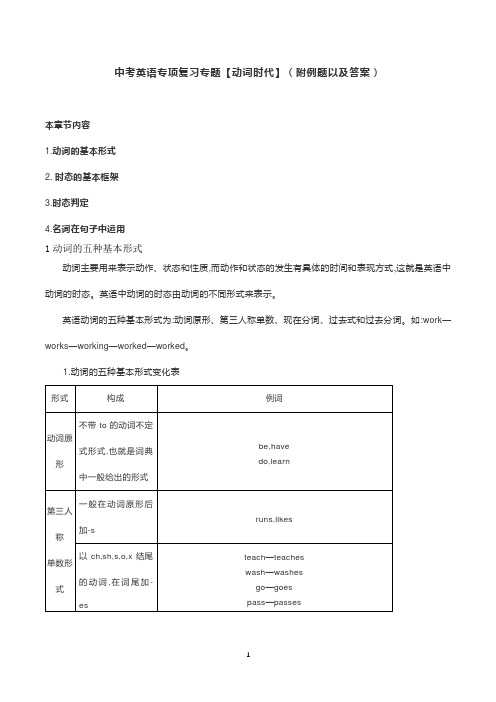
中考英语专项复习专题【动词时代】(附例题以及答案)本章节内容1.动词的基本形式2. 时态的基本框架3.时态判定4.名词在句子中运用1动词的五种基本形式动词主要用来表示动作、状态和性质,而动作和状态的发生有具体的时间和表现方式,这就是英语中动词的时态。
英语中动词的时态由动词的不同形式来表示。
英语动词的五种基本形式为:动词原形、第三人称单数、现在分词、过去式和过去分词。
如:work—works—working—worked—worked。
1.动词的五种基本形式变化表2时态的基本框架常见六种时态的构成及用法(1)一般现在时用法:①现在经常性的状态或动作;②客观事实和真理。
构成:①be+表语;②实义动词作谓语标志词:often, sometimes, usually, always, never,twice a month, every day/week/month/year(every系列)例句:He usually gets to school early.他通常很早到校。
The moon moves around the earth.月亮绕着地球转。
练一练1.认识从实践开始Knowledge practice.2.如果明天下雨,我们就不去公园了。
If it tomorrow,we to the park.【答案】1. begins with.2.rains,won’t go(2)一般过去时用法:表示过去的动作或状态。
构成:①was/were+表语;②实义动词作谓语标志词:a moment ago,just now,ago, yesterday, last night/week/month(last系列)例句:We went to Yunnan last Monday.上周一我们去了云南。
1.She (not visit)her aunt last weekend.2.My friend,Lucy, (study)for the math test and (practice)English last night. 【答案】1.didn’t visit 2.studied practiced(3)一般将来时用法:表示将来的动作或状态。
中考英语词汇专题复习教案
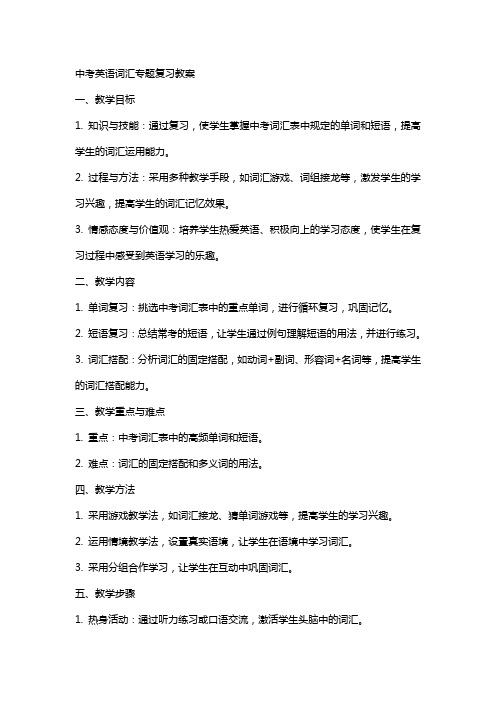
中考英语词汇专题复习教案一、教学目标1. 知识与技能:通过复习,使学生掌握中考词汇表中规定的单词和短语,提高学生的词汇运用能力。
2. 过程与方法:采用多种教学手段,如词汇游戏、词组接龙等,激发学生的学习兴趣,提高学生的词汇记忆效果。
3. 情感态度与价值观:培养学生热爱英语、积极向上的学习态度,使学生在复习过程中感受到英语学习的乐趣。
二、教学内容1. 单词复习:挑选中考词汇表中的重点单词,进行循环复习,巩固记忆。
2. 短语复习:总结常考的短语,让学生通过例句理解短语的用法,并进行练习。
3. 词汇搭配:分析词汇的固定搭配,如动词+副词、形容词+名词等,提高学生的词汇搭配能力。
三、教学重点与难点1. 重点:中考词汇表中的高频单词和短语。
2. 难点:词汇的固定搭配和多义词的用法。
四、教学方法1. 采用游戏教学法,如词汇接龙、猜单词游戏等,提高学生的学习兴趣。
2. 运用情境教学法,设置真实语境,让学生在语境中学习词汇。
3. 采用分组合作学习,让学生在互动中巩固词汇。
五、教学步骤1. 热身活动:通过听力练习或口语交流,激活学生头脑中的词汇。
2. 新课导入:介绍本节课要复习的单词和短语,让学生明确学习目标。
3. 课堂讲解:讲解单词和短语的用法,分析词汇的固定搭配。
4. 练习巩固:设计不同类型的练习题,让学生在实践中运用所学词汇。
5. 总结反馈:对本节课的复习内容进行总结,查漏补缺。
6. 课后作业:布置适量的作业,让学生巩固所学词汇。
7. 教学评价:定期对学生的词汇掌握情况进行检测,了解教学效果,调整教学策略。
六、教学活动设计1. 单词记忆游戏:通过卡片游戏、拼写比赛等形式,让学生在游戏中记忆单词。
2. 短语接龙:学生分组进行短语接龙游戏,增加短语的记忆和运用。
3. 词汇搭配练习:给出词汇,让学生搭配正确的形容词、副词等,巩固词汇搭配。
4. 语境填空:提供文章或对话,让学生在语境中正确运用所学词汇。
七、教学资源1. 词汇卡片:制作单词和短语的卡片,方便学生随时复习。
中考英语知识点复习
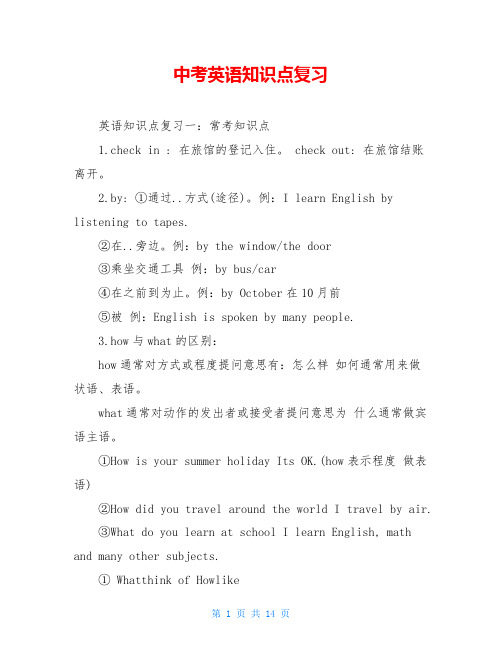
中考英语知识点复习英语知识点复习一:常考知识点1.check in : 在旅馆的登记入住。
check out: 在旅馆结账离开。
2.by: ①通过..方式(途径)。
例:I learn English by listening to tapes.②在..旁边。
例:by the window/the door③乘坐交通工具例:by bus/car④在之前到为止。
例:by October在10月前⑤被例:English is spoken by many people.3.how与what的区别:how通常对方式或程度提问意思有:怎么样如何通常用来做状语、表语。
what通常对动作的发出者或接受者提问意思为什么通常做宾语主语。
①How is your summer holiday Its OK.(how表示程度做表语)②How did you travel around the world I travel by air.③What do you learn at school I learn English, math and many other subjects.① W hatthink of Howlike② Whatdo with Howdeal with③ Whatlike about Howlike④ Whats the weather like today Hows the weather today⑤ What to do How to do ite.g. What do you think of this book=How do you like this bookI dont know what I should do with the matter.=I dont know how I should deal with it.What do you like about China=How do you like ChinaI dont know what to do ne_t step=I dont know how to do it ne_t step㊣ What good / bad weather it is today!(weather为不可数名词其前不能加 a )㊣ What a fine / bad day it is today! (day为可数名词其前要加 a )4. aloud, loud与loudly的用法:三个词都与大声或响亮有关。
中考英语专题复习(句型)

中考专题复习句型综合复习一、选择题。
( ) 1. There ________ a movie in the cinema.A. isB. areC. beD. has( ) 2. ________ there a zoo in your city?A. IsB. BeC. AreD. Were( ) 3. Be quick! ________ be late for school!A. Won’tB. Don’tC. NotD. Be not ( ) 4. ________ slowly the tortoise runs!A. WhatB. What aC. HowD. How a( ) 5. How many rabbits ________ there just now?A. areB. isC. hsD. were( ) 6. Please ________ smoke here, Look! “________ Smoking”!A. no, Don’tB. don’t, NoC. don’t, Don’tD. no, No ( ) 7. There ________ some milk and two apples on the desk.A. haveB. hasC. isD. are( ) 8. ________ high he jumps!A. WhatB. HowC. How aD. What a ( ) 9. Be quiet! ________ talk in the class.A. Won’tB. Not beC. NoD. Don’t ( ) 10. There ________ a basketball match tomorrow morning.A. isB. is going toC. areD. will be ( ) 11. ________ beautiful the flowers are!A. HowB. WhatC. What aD. How a ( ) 12. ________ the car in the parking place, please.A. ParkingB. ParksC. ParkD. Parked ( ) 13. You are ill. Please ________ in bed and have a good rest.A. stayingB. don’t stayC. staysD. stay( ) 14. ________ bad weather it is!A. WhatB. What aC. HowD. How a ( ) 15. ---________ ruler is this? --- It’s ________.A. Who’s, hisB. Whose, herC. Whose, hisD. Who’s, hers( ) 16. --- Are you new students? --- Yes, ________.A. I amB. you areC. they areD. we are ( ) 17. ________ wrong with your computer?A. What’sB. WhereC. WhenD. What ( ) 18. ---________ does your mother ________ to Beijing? --- Last year.A. When, goesB. Where, goC. How, goesD. When, go ( ) 19. --- Excuse me, ? --- It’s over there.A. what’s on the deskB. where is my bagC. what is it?D. whose bag is it( ) 20. There ________ two pieces of paper under the chair.A. isB. areC. hasD. have二、选出错误的选项并把正确的答案写在题后的横线上。
中考英语专题复习:词汇、句型和语法

中考英语专题复习:词汇、句型和语法一、提示词填空1.Welcome to the London ______(动物园).2.My mum often says to me, "Work hard. Don't be ______(懒惰的)."3.In spring, the park is ______(美丽的)with all kinds of flowers.4.What ______(种类)of coffee would you like?5.We want to plant some trees in the ______(南部)of our school.6.—How many hours do you ______(睡觉)every day?—About nine hours.7.Sydney is a famous city and it is in ______(澳大利亚).8.The boy wants to learn more about ______(非洲).9.The girl is very______(害羞的)and she is afraid of talking to others.10.We want to do something to______(救助)the wild animals.11.There are some red______(旗帜)on the wall.12.My grandfather is too old,and he often______(忘记)his name.13.It is a good______(地方)for swimming.14.Mike is my friend. He is from _______(澳大利亚).15.Kate is a s______ girl, so this math problem(问题)is easy for her.二、用适当形式填空1.—Why is Alan so popular in your class?—Because he is very______(friend)to everyone.2.It's______(danger)to play with fire.3.She doesn't have a map or a mobile phone,so she may get______(lose).4.When we go abroad, we can see many things______(make)in China.5.Don't forget______(close) the windows when you go out.6.(2020包头中考模拟)The town is in the ________(southern)of China.7.There are many _______(zoo)in Beijing and lots of animals are in them.8.Elephants can remember _______(place)with food and water.三、补全句子1.—那个男孩来白哪里?—他来自南京。
中考英语状语从句专题复习

中考英语状语从句专题复习一、初中英语状语从句1.-What’s your opinion about friends?-They are like books. We don’t need a lot of them they’re good.A.as long as B.as soon as C.so that D.as if【答案】A【解析】【详解】句意“-关于朋友,你的观点是什么?-他们像书,只要他们好,我们不需要太多”。
A.只要(引导条件状语从句);B.一……就……(引导时间状语从句);C.目的是,为的是(引导目的状语从句);D.好像(引导方式状语从句)。
根据句意可知,译为“只要他们好”,引导条件状语从句,故选A。
2.Many people do not realize the importance of health ______ they have fallen ill.A.until B.while C.when D.after【答案】A【解析】试题分析:句意:一些人直到失去了健康才意识到它的重要性。
本题考查的是not…until 句型,“直到……才”。
For为了;but 但是;as 作为。
故选A。
考点:考查连词的用法。
3.Rony will get a chance to work in this company ________ he doesn’t pass the interview. A.unless B.when C.if D.after【答案】A【解析】【详解】句意“除非罗尼没有通过面试,否则他将有机会在这个公司上班”。
A.除非;B.当……时候;C.如果;D.在……时候。
根据句意可知,表示“除非他没有通过面试”,故选A。
4.— What do you think of your junior middle school life?— I think it is colorful, I’m always busy.A.though B.while C.until D.because【答案】A【解析】【详解】本题考查:副词辨析。
2023年中考英语复习专题复习一名词+学案

专题复习一-------名词了解名词的含义和分类及用法名词的概念:表示人、事物、地点或抽象概念的名称。
如:door, apple, China, air等。
名词分为:______名词和______名词两大类。
普通名词又分为_______名词和_______名词两种。
考点一:不可数名词1、不可数名词包括物质名词和抽象名词,它们不能直接和表示数字的词或不定冠词连用,也没有_______形式。
常考的不可数名词有:news(新闻), information(信息), 建议________, 天气________, 家庭作业____________, 时间_______, 钱__________, 纸___________,音乐___________等。
2、不可数名词可以借助______来表示一定的数量。
但也可以用much(许多), some/any(一些), a little(一点点),little (几乎没有) plenty of(很多), a lot of(=lots of)(许多)等修饰不可数名词。
一则新闻:a piece of news ; 两瓶水:two bottles of water ;四条建议______________________ ; 六张纸_________________ ;你能借给我一些钱吗?Could you lend me__________________?【中考真题再现】( ) 1. All the _____ are made of ______ , not plastics.A. glass; glassB. glasses, glassC. glasses , glassesD. glass, glasses( ) 2. Jenny gave us ____ on how to improve English.A. some advicesB. many advicesC. some adviceD. an advice考点二:可数名词单数变为复数的几条规律1、一般直接加-s: 比如:girl---__________map---_________2、以-s, -x, -sh, -ch结尾的单词常在词尾加—es: 比如:bus—_______ brush---_______3、以辅音字母+y结尾变y为i,再加—es: 比如:story---_______ baby---_______4、以--o结尾的名词变复数常有下列2种变化:①【口诀:黑人和英雄正在吃士豆和西红柿。
2024年中考英语专题复习精练—完形填空1
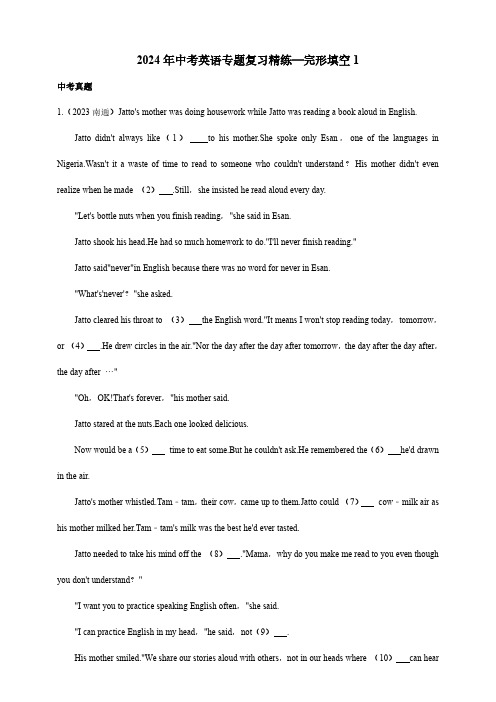
2024年中考英语专题复习精练—完形填空1中考真题1.(2023南通)Jatto's mother was doing housework while Jatto was reading a book aloud in English.Jatto didn't always like(1)to his mother.She spoke only Esan,one of the languages in Nigeria.Wasn't it a waste of time to read to someone who couldn't understand?His mother didn't even realize when he made(2).Still,she insisted he read aloud every day."Let's bottle nuts when you finish reading,"she said in Esan.Jatto shook his head.He had so much homework to do."I'll never finish reading."Jatto said"never"in English because there was no word for never in Esan."What's'never'?"she asked.Jatto cleared his throat to(3)the English word."It means I won't stop reading today,tomorrow,or(4).He drew circles in the air."Nor the day after the day after tomorrow,the day after the day after,the day after…""Oh,OK!That's forever,"his mother said.Jatto stared at the nuts.Each one looked delicious.Now would be a(5)time to eat some.But he couldn't ask.He remembered the(6)he'd drawn in the air.Jatto's mother whistled.Tam﹣tam,their cow,came up to them.Jatto could(7)cow﹣milk air as his mother milked her.Tam﹣tam's milk was the best he'd ever tasted.Jatto needed to take his mind off the(8)."Mama,why do you make me read to you even though you don't understand?""I want you to practice speaking English often,"she said."I can practice English in my head,"he said,not(9).His mother smiled."We share our stories aloud with others,not in our heads where(10)can hearthem."Jatto nodded.He'd learned about that in school.She decided to tell him a story and handed him some nuts and milk."You can eat(11)I talk."He ate as she started.Soon,Jatto was singing the story with his mother."You never tell me stories,"he said when they stopped(12).She sighed."I used to,but when you started school,I wanted you to focus on English.""I make a lot of mistakes when I read to you,"Jatto said.His mother(13)."I guessed so.But I like hearing the sound of your voice while I work."Jatto knew what she meant.He had enjoyed listening to her story as he bottled the nuts.It made the work seem(14)."I have an idea,"he said."Next time,I will read a story to you in English,then I will tell you the same story in Esan.We can even make up songs together.""Great!And I will tell you stories in Esan and you can say them back to me in English.Let's'never'stop (15)stories."Jatto smiled.His mother's understanding of never was even better than his own.(1)A.talking B.reading C.replying D.listening(2)A.mistakes B.jokes C.efforts D.noises(3)A.speak B.pronounce anize D.explain(4)A.the day before B.the last day C.the day after D.in the future(5)A.good B.free C.busy D.bad(6)A.nuts B.bottles C.circles D.cows(7)A.see B.smell C.feel D.hear(8)k B.cow C.story D.food(9)A.alone B.aloud C.kindly D.directly(10)A.nobody B.somebody C.anybody D.everybody(11)A.before B.while C.after D.until(12)A.saying B.eating C.singing D.chatting(13)A.shouted B.cried C.praised ughed(14)A.easier B.slower C.heavier D.shorter(15)A.practicing B.telling C.sharing D.writing【分析】这篇短文主要写了Jatto的母亲让他每天大声朗读英语,尽管她听不懂。
- 1、下载文档前请自行甄别文档内容的完整性,平台不提供额外的编辑、内容补充、找答案等附加服务。
- 2、"仅部分预览"的文档,不可在线预览部分如存在完整性等问题,可反馈申请退款(可完整预览的文档不适用该条件!)。
- 3、如文档侵犯您的权益,请联系客服反馈,我们会尽快为您处理(人工客服工作时间:9:00-18:30)。
中考英语专题复习——定语从句专项复习【考点扫描】中考对定语从句的考查主要集中在以下几个方面:1.定语从句的功用和结构2.关系代词和关系副词的功用3.各个关系代词和关系副词的具体用法考查的主要形式是单项填空、完型填空、短文填空和完成句子。
阅读理解和书面表达肯定也要用到定语从句。
一. 定语从句的功用和结构在复合句中,修饰某一名词或代词的从句叫做定语从句。
被定从句修饰的词叫做先行词。
定语从句必须放在先行词之后。
引导定语从句的关联词有关系代词和关系副词。
例如:This is the present that he gave me for my birthday.Do you know everybody who came to the party?I still remember the night when I first came to the village?This is the place where Chairman Mao once lived.二. 关系代词和关系副词的功用关系代词和关系副词用来引导定于从句,在先行词和定语从句之间起纽带作用,使二者联系起来。
关系代词和关系副词又在定语从句中充当一个成分。
关系待客做主语,宾语,定语,关系副词可作状语。
1. 作主语:关系代词在定语从句中作主语时,从句的谓语动词的人称和数须和先行词一致。
例如:I don’t like people who talk much but do little.The cars which are produced in Hubei Province sell very well.2. 作宾语:She is the person that I met at the school gate yesterday.The book that my grandmother gave me is called “The Great Escape”.3. 作定语关系代词whose在定语从句中作定语用。
例如:What’s the name of the young man whose sister is a doctor?The girl whose father is a teacher studies very hard.4. 作状语I’ll never forget the da y when I first came to Beijing.This is the house where I was born.三. 各个关系代词和关系副词的具体用法1. who 指人,在定语从句中作主语。
例如:The person who broke the window must pay for it.The boy who is wearing the black jacket is very clever.2. whom指人,在定语从句中作宾语。
例如:Do you know the young man (whom) we met at the gate?Mr Lee (whom) you want to see has come.3. whose 指人,在定语从句中作定语。
例如:The girl whose mother is ill is staying at home today.I know the boy whose father is a professor.4. which指物,在定语从中作主语或宾语。
例如:A dictionary is a book which gives the meaning of words.Here is the book (which) the teacher mentioned yesterday.5. that多指物,有时也指人,在定语从句中作主语或宾语。
例如:I’ve read the newspaper that(which) carries the important news.Who is the person that is reading the newspaper over there?6. when 指时间,在定语从句中作状语。
例如:I’ll never forget the time when we worked on the farm.He arrived in Beijing on the day when I left.7. where 指地点,在定语从句中作状语。
例如:This is the house where we lived last year.The factory where his father works is in the east of the city.四. 关系代词whom,which 在定语从句中作介词宾语时,可以和介词一起放于先行词与定语从句之间,有时为了关系紧凑也可以将whom 与which 与先行词紧挨着书写,而将介词置于定语从句的后面,如:That was the room in which we had lived for ten years. = That was the roomwhich we had lived in for ten years.五. 具体使用时还要注意下列问题:1. 只能使用that,不用which 的情况:(1) 先行词是all, few, little, nothing, everything, anything 等不定代词时。
例如:All that he said is true.(2) 先行词被only, no, any, all,等词修饰时。
例如:He is the only foreigner that has been to that place.(3) 先行词是序数词或被序数词修饰的词。
例如:He was the second (person) that told me the secret.(4) 先行词是形容词最高级或被形容词最高级修饰的词。
This is the best book (that) I have read this year.(5) 先行词既包括人又包括物时。
例如:He talked about the people and the things he remembered.2. 只能用which,不用that 的情况:(1) 在非限制性定语从中。
例如:The meeting was put off, which was exactly what we wanted.(2) 定语从句由介词+关系代词引导,先行词是物时。
例如:The thing about which he is talking is of great importance.【中考范例】1. ---Does the teacher know everybody _______ planted the trees?---Yes, he does.A. whichB. whoseC. whereD. who【解析】答案:D。
该题考查的是引导定语从句的关系代词的选择。
因为先行词是人,而关系代词又在定语从句中作主语,所以只有who合适。
2. The letter _______ I received from him yesterday is very important.A. whoB. whereC. whatD. that【解析】答案:D。
该题考查的是定语从句的关系代词的选择。
因为先行词是物,而关系代词在定语从句中作宾语,所以只有that合适。
3. ---Where is the scientist ________ gave us the talk yesterday?---He has gone back to Qinghua University. A. whom B. who C. whose D. which【解析】答案:B。
该题考查的是引导定语从句的关系代词的选择。
因为先行词是人,而关系代词又在定语从句中作主语,所以只有who合适。
4. I hate people _______ talk much but do little.A. whoseB. whomC. whichD. who【解析】答案:D。
该题考查的是引导定语从句的关系代词的选择。
因为先行词是人,而关系代词又在定语从句中作主语,所以只有who合适。
一. 单项填空1. ---Who is the man _______ was talking to our English teacher?---Oh! It’s Mr Baker, our maths teacher.A. heB. thatC. whomD. which2. I hate the people ________ don’t help others when they are in trouble.A. whoB. whichC. theyD. where3. The foreigner _________ visited our school is from Canada.A. whichB. whenC. whoD. whom4. George Mallory was an English school teacher _______ loved climbing.A. whoB. whomC. heD. which5. This is the place _____I have ever visited.A. thereB. whenC. whereD. which6. Nobody knows the reason ______ she didn’t come to t he meeting.A. thatB. whichC. whyD. when7. The moon is a world ______ there is no life.A. thatB. whichC. whereD. why8. He has forgotten the day _______ he arrived.A. whenB. whereC. thatD. which9. He still remembers the days ______ he spent with your family.A. whenB. whereC. thatD. on which10. Mr. White, ______ car had been stolen, came to the policeman.A. whoB. thatC. whoseD. which11. He got to the village _______ his family once lived before liberation.A. thatB. whichC. whenD. where12. This is the house _______ I want to buy.A. in whichB. thatC. whoseD. where13. This is the house _______ our beloved Premier Zhou once lived and worked.A. whichB. thatC. whenD. where14. He d idn’t tell me the place _______ he was born.A. thatB. whichC. whenD. where15. He lived in a small village, ______ was a long way from the railway station.A. thatB. whichC. whereD. when二. 用关系代词或关系副词将下列每对句子连成一个复合句1. The boy is my younger brother. He was here a minute ago.___________________________________________________________2. The old man is a professor. He teaches chemistry in a college.___________________________________________________________3. Beijing Hotel is near Tian An Men Square. The foreign visitors live there.___________________________________________________________ 4. The woman is here now. You were talking about her.___________________________________________________________ 5. This is the hall. We listened to the report in it the other day.___________________________________________________________ 6. The car was going 90 miles an hour. The car just passed us.___________________________________________________________ 7. The man waved to us. The man was my uncle.___________________________________________________________ 8. I enjoyed reading the book. You gave me a book last week.___________________________________________________________ 9. I prefer the subject. The subject is science.___________________________________________________________ 10. I spoke to the man. The man is a professor.___________________________________________________________三. 用适当的关系代词或关系副词填空1. The house _______ we live in is very big.2. The boy ______ is wearing the black jacket is very clever.3. This is the present _____ he gave me for my birthday.4. The man _______ talked to you just now is an engineer.5. He talked about the teachers and schools _______ he had visited.6. There is nothing in the world _______ can frighten him.7. She wears a gold ring, _______ is very uncommon in our class.8. We visited a factory _______ makes toys for children.9. Is this the place _______ your father once lived?10. I’ll never forget the days _______ I joined the League.。
